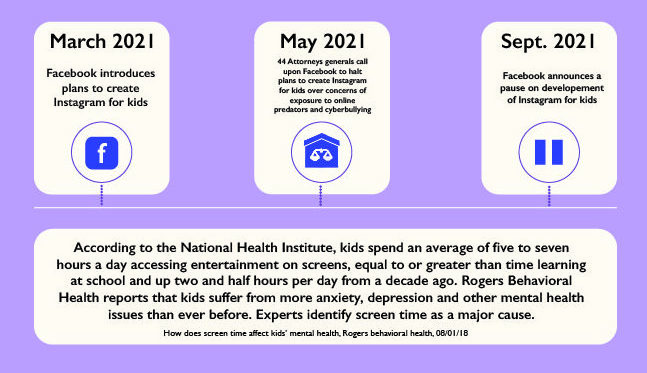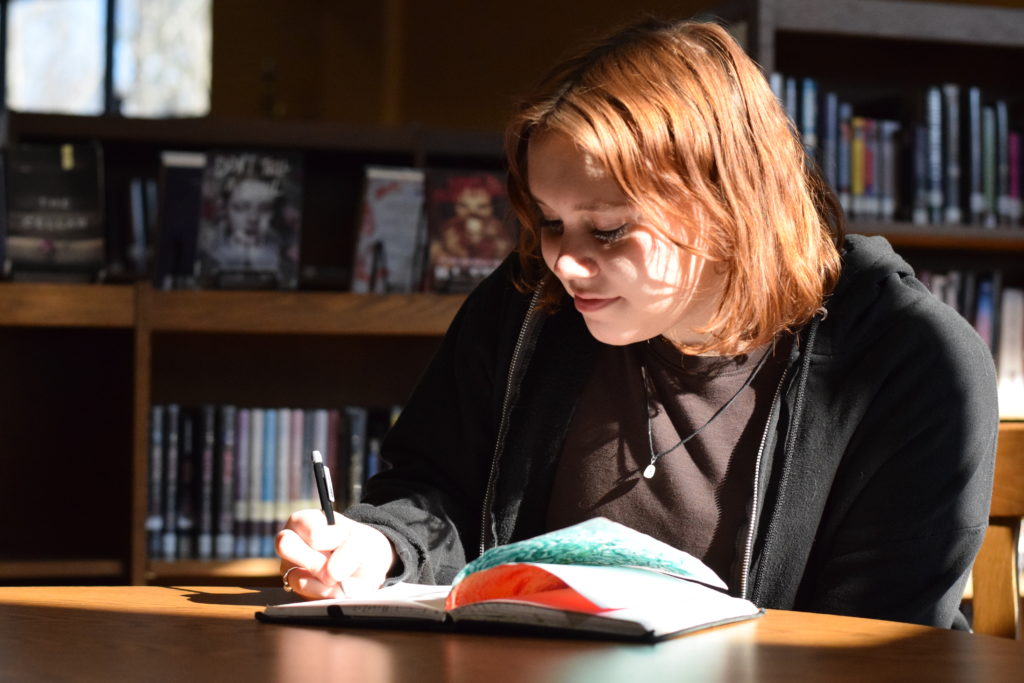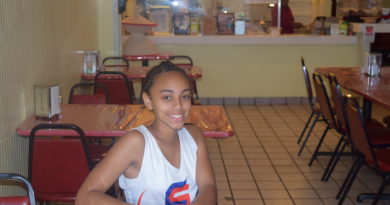Head in the clouds: students’ overwhelming urge to escape
As of 2019, the average teenager spends up to nine hours a day on a screen, according to The American Academy of Child & Adolescent Psychiatry. These habits can have long-lasting effects such as sleep, weight and mood problems, as well as lower grades in school.
Teenagers find themselves using their phones and other forms of technology as a coping mechanism. Sophomore Samantha Goldberg has found herself relying on technology.
“I use my phone a lot as escapism to really just get out of my own head, as well as other hobbies, like doing art and watching shows. It just gets in the way of your actual life. When you need to focus on what actually needs to be focused on, it becomes a problem and a distraction,” Goldberg said.
Because screens are so prominent in our everyday lives, it becomes difficult to dissociate activities where they may be needed from those where they are simply just for amusement.
“There are benefits, but I think the problem comes in when it’s overused and misused, and it becomes an escape. A person really has to have a lot of self discipline to use screens well, and that’s hard. I think it’s gotten a lot worse with a pandemic because so many people have had to be on their devices or had to do virtual school,” professional counselor Betsy Wicklein said.
With the 2020-21 school year being almost entirely virtual, screens became even more embedded in everyday life. For some, it meant they had trouble getting their work done, and for others, technology became more of a chore than enjoyment.
“Screens became an escape from schoolwork itself and I wasn’t really focusing on school. Instead, I was just on my phone, and that became a problem,” Goldberg said.
Unlike Goldberg finding distractions in technology, Junior Rebekah Marsden avoided screens after long days of virtual school.
“I know virtual learning was our best option, but I realized screens are not that big of a deal. They’re important of course, but they’re not necessary. Before I felt like I needed to be on my phone but I realized there are other ways I can do things,” Marsden said.
According to psychiatrist Colleen McLemore, virtual school and the pandemic correlate with a rise in multiple different mental health issues in teenagers resulting in an upsurge in teenagers meeting with therapists.
“The pandemic necessitated the shutdown of many in person schools, so virtual school (was) the norm and has been challenging. There has been a reported increase in anxiety, OCD, conduct problems and worsening of pre-existing psychiatric disease states,” McLemore said.

Escapism, or the tendency to seek relief from reality through distractions, entertainment or even fantasy, is a common habit. It is natural to look for something calming when facing unimaginable feelings or situations. However, completely ignoring emotions or responsibilities can in turn worsen them.
“Distraction is one coping mechanism among many which can be healthy if combined with other healthy coping skills. This doesn’t mean one should ignore emotions or stop working towards good mental health,” McLemore said.
This disengagement may be easy and relieving for teenagers dealing with struggles such as schoolwork, friendship problems and anxiety. Like many others, Marsden uses television shows as a form of escapism.
“When you watch shows you get put into another world or reality. It’s nice to sometimes be part of something else and not have to deal with what you may actually be going through,” Marsden said.
As a result of quarantine, families began spending much more time together. Carol Marsden noticed that hobbies such as art positively affected her daughter Rebekah.
“Art has been a great outlet for her. She has been able to express her emotions in a healthy way through drawing, painting and doodling. She shares her selfless love through her artwork,” Marsden said.
While the tendency to cope using distractions can form great short term satisfaction, it can also cause a habit of ignoring responsibilities and emotions. Pediatrician Alan Glassman says escapism, when used excessively, can be unhealthy.
“I don’t think there’s any problem with escapism, fantasy and distractions. These are reasonable things to do but there just has to be a better balance. You have to learn to evaluate yourself and your actions, and how to plan out what you want to do and who you want to be,” Glassman said. “You are escaping having to think about things you don’t want to think about all the time, but if you never have that time where you process unpleasant thoughts you aren’t taking on the responsibilities that you should be taking on.”
Screens play a major role in our everyday lives, with over 90% of Americans using the internet. Because of the accessibility of social media and internet, phones, televisions and video games have become main methods of escapism, especially in teenagers. Due to the growth in technology use in the past decade, young children are being exposed to screens as infants, which is believed to be unhealthy for neural development.

Glassman points to the American Academy of Pediatrics recommending children under two are not exposed to screens at all — whether in their car seat, playpen or under the care of another person.
“When a baby is interacting with somebody else, there should be no electronics involved with that,” Glassman said.
During the first few years of life, a child’s brain is constantly developing. Interactions spur connections that determine how to process their environment. One such interaction, watching a screen, can be destructive to that crucial early development.
“There is truly what we call a ‘window of opportunity’ where the brain grows the most and the best very early in life. Being a child is a learning experience, and it needs to be a hands-on learning experience,” Glassman said.
The amount of time teenagers spend separating themselves from the real world can limit contact with friends and family. Over 70% of our communication is nonverbal Wicklein says, which is where the disconnect between screens and face to face conversations poses the greatest barrier.
“Even though we can FaceTime or Skype, it’s not the same. You’re not in the same room, you’re not able to reach out and touch that person. Humans miss a lot of the human connection,” Wicklein said.
Reflecting over quarantine, Marsden has learned much about herself and how she views electronics and hobbies.
“When you’re bored you have time to think, and even though the whole point of me watching TV or reading was to not think, quarantine basically kind of made me think about things and understand things,” Marsden said. “Overall, it actually helped me understand what affected my mental health the most.”




